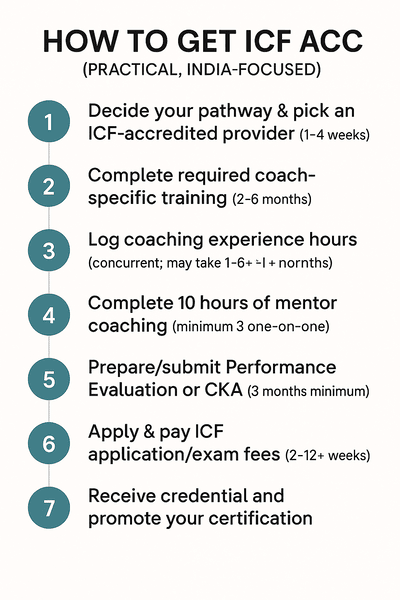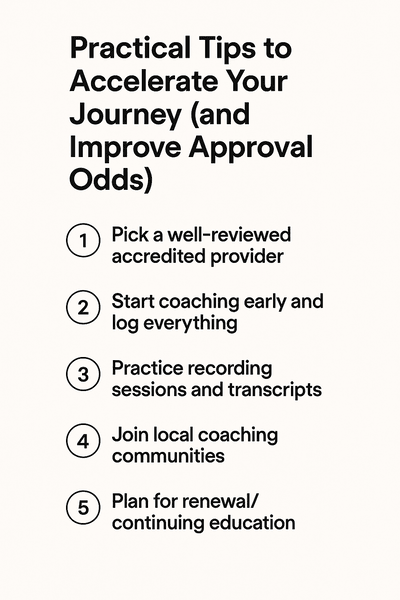- ICF credentials: ACC (Associate), PCC (Professional), MCC (Master). Each has education, mentoring, experience and performance evaluation requirements set by the International Coaching Federation (ICF). ICF+1
- Core steps: Choose an ICF-accredited training route → complete required coach-specific training hours → log coaching experience hours → complete mentor coaching and performance evaluation → apply & pass the ICF exam where required. ICF+1

- India realities (2025): Accredited programs from India-based providers (e.g., xMonks, others) make the process easier; costs vary widely — expect training program fees commonly between ~₹70,000–₹250,000 INR for ACC-level training depending on format (self-study vs live cohort), plus ICF application/exam fees. xMonks
- Timeline: ACC can be done in ~3–12 months (if you pursue an accredited ACC pathway and accrue required hours quickly). PCC typically takes 6–24+ months depending on experience hours. MCC is a long-term goal (years of coaching experience). ICF
Why get ICF certified in 2025 (and is it worth it in India)?
ICF is the globally-recognized standard for professional coaching. An ICF credential signals training rigor, ethical standards, and competence to clients and corporate buyers. In India’s rapidly growing coaching market — from executive coaching in corporates to life/coaching niches — an ICF badge improves credibility, increases consulting and corporate opportunities, and often supports higher per-session fees.
Beyond marketing value, the certification process itself (mentor coaching, performance evaluation, log of practice hours) is designed to build better coaching skills — not just a certificate on LinkedIn. If you plan to coach seriously (private clients, corporate contracts, programs), ICF remains a high-return investment.
The ICF credentials at a glance (2025)
Associate Certified Coach (ACC)
- Education: Minimum 60 hours of coach-specific training via an ICF-accredited or ICF-permitted program (paths vary).
- Experience: Minimum 100 coaching experience hours (with at least 75 paid).
- Mentor coaching: 10 hours (minimum 3 one-on-one hours).
- Performance evaluation: Pass performance evaluation if required for your path.
- Exam: Most applicants must pass the ICF Coach Knowledge Assessment (CKA) when applying via some paths.
Professional Certified Coach (PCC)
- Education: Minimum 125 hours of coach-specific training (or relevant accredited Level 2/Path).
- Experience: Minimum 500 coaching experience hours.
- Mentor coaching: 10 hours (again minimum three one-on-one).
- Performance evaluation & exam: Submit recordings/transcripts if required and take CKA depending on pathway.
Master Certified Coach (MCC)
- Education: 200+ hours of coach-specific training.
- Experience: 2,500+ coaching hours (often accrued across many years).
- Mentor coaching & performance evaluation: Required. MCC candidates must demonstrate master-level coaching in recordings and evaluations.
(There are also Advanced or Team Coaching certifications like ACTC — see ICF for details.) ICF
ICF credential pathways (how you qualify)
ICF provides multiple paths to each credential. The main ones are:
- ACTP / Level 2 (formerly ACTP): A full ICF-accredited coach training program that includes the training hours and mentor coaching required. Graduating from a full program often simplifies the application because your training provider submits documentation directly. Erickson
- ACSTH / Level 1: Approved coach-specific training hours (e.g., 60 for ACC). You combine those hours with mentor coaching and your own coaching practice to apply. ICF
- Portfolio Path: For coaches who hold non-ICF certifications or have completed training before ICF accreditation pathways were formalized — requires submitting recorded coaching sessions and transcripts for evaluation. ICF
Which path is best? For most beginners in India, enrolling in an ICF-accredited ACSTH/ACTP program (India-based or international provider) is easiest — the program handles documentation and mentor coaching, and often includes community support to complete coaching hours. xMonks, Erickson, and others run accredited programs accessible to Indian learners. xMonks Erickson
Step-by-step: How to get ICF ACC (practical, India-focused)
Below is a typical route for an Indian coach aiming for ACC in 2025. I’ll include realistic timelines and cost estimates.
Step 1 — Decide your pathway & pick an ICF-accredited provider (1–4 weeks)
- Research accredited providers (India-based or global). Look for ACTP or ACSTH accreditation so your training hours are recognized. Examples of India-accessible providers include xMonks and global names that run cohorts in India or remote cohorts. xMonks Erickson
- Factor format: self-paced vs live cohort; live cohorts cost more but give structured mentor coaching and peer practice.
Estimated cost (India, 2025):
- Basic ACSTH 60-100 hour ACC prep: ~₹70,000–₹150,000.
- More intensive ACTP programs or premium providers: ₹150,000–₹350,000+ (varies widely). (These are approximate ranges; confirm with the provider.) xMonks

Step 2 — Complete required coach-specific training (2–6 months)
- Attend synchronous sessions, complete assignments, peer coaching hours that training provides.
- Ensure your program issues the certificate of completion that lists ACSTH or ACTP hours (you’ll submit this to ICF).
Step 3 — Log coaching experience hours (concurrent; may take 1–6+ months)
- For ACC you need 100 client coaching hours (at least 75 paid). Start coaching friends/family/volunteers if you need unpaid hours, then switch to paying clients. Keep a precise coaching log with dates, client initials, session lengths — ICF will ask for this when you apply.
Step 4 — Complete 10 hours of mentor coaching (minimum 3 one-on-one) (3 months minimum)
- Mentor coaching helps you refine coaching skills and prepare for performance evaluation. Many accredited programs include mentor coaching; if not, hire an ICF-certified PCC/MCC mentor. Mentor coaching must span at least three months.
Step 5 — Prepare/submit Performance Evaluation or CKA (timing depends)
- Depending on the pathway, you may need to submit an audio recording and transcript of a coaching session for ICF performance evaluation, or take the Coach Knowledge Assessment (CKA). Check your chosen path’s requirements on the ICF portal and follow the instructions exactly.
Step 6 — Apply & pay ICF application/exam fees (2–12+ weeks for review)
- Submit the application, upload training certificates and coaching log, and pay the fee. Member vs non-member pricing differs (ICF member discounts apply). Timeline for review varies by credential and path (weeks to months). After approval, schedule any required exam via Pearson VUE.
Step 7 — Receive credential and promote your certification
- After passing the necessary checks (and exam, if required), you’ll receive your credential and can list it on your website, LinkedIn, and proposals.
Total realistic timeline in India (ACC): 3 months (fast track if you already have training and hours) to 12 months (typical for those building hours while upskilling). Costs combine training + mentor coaching + ICF fees (~varies by provider & currency).
What about PCC and MCC? (next-level expectations)
PCC (short checklist)
- 125+ training hours (or entire Level 2/Path).
- 500 coaching hours.
- 10 hours mentor coaching.
- Performance evaluation & CKA as required by your path.
- Typical timeline: 6–24+ months depending on how fast you accumulate coaching hours.
MCC (short checklist)
- 200+ training hours.
- 2,500 coaching hours (a multi-year accumulation).
- High-quality performance recordings demonstrating advanced coaching mastery.
- MCC is a professional milestone typically achieved after years of coaching, advanced supervision, and sustained client results.
Fees & budgets — realistic numbers for India (2025)
- Training program fees (India-accessible)
- Entry-level ACSTH/ACC-oriented courses: ₹70k–₹150k INR.
- Full ACTP (deep programs, PCC-track): ₹150k–₹350k+.
- Premium/global schools (in-person intensives + mentoring): can exceed ₹350k.
(Prices depend on program length, live mentorship inclusion, alumni support, and whether the program includes CKA prep/recording review.) xMonks
- ICF application & exam fees (USD-based, paid to ICF):
- ICF charges for credential applications and exams vary (ICF member vs non-member). Example ranges (indicative in 2024–25): ACC application ~$300–$800 USD depending on path; PCC application ~$375–$800; non-member surcharges apply. Convert to INR at prevailing rates; ICF site and Pearson VUE show exact fees.
- Mentor coaching costs (if bought separately):
- Mentor coaching typically billed hourly or as packaged hours; estimate ₹3,000–₹15,000 per hour depending on mentor’s credentials (PCC/MCC) and market. Many programs bundle mentor coaching.
- Opportunity cost: time invested in coaching hours, practice sessions, and admin.
Tip: Budget conservatively. A full ACC journey in India (training + mentoring + application fees) often totals ₹1 lakh – ₹3 lakh depending on choices (self-study + low-cost mentor coaching vs premium ACTP with all extras). Confirm with providers for current 2025 pricing. xMonks

Practical tips to accelerate your journey (and improve approval odds)
- Pick a well-reviewed accredited provider. If your program is ACTP/ACSTH-accredited, your documentation path becomes smoother. xMonks, Erickson, and others run India-accessible accredited programs. xMonks Erickson
- Start coaching early and log everything. Keep accurate records (client initials, date, session length, paid/unpaid). ICF requires explicit hour breakdowns.
- Invest in mentor coaching with a credentialed mentor. Mentor coaching is an ICF requirement — ensure your mentor is recognized (PCC or MCC preferred). Many programs include this; if not, buy it separately.
- Practice recording sessions and transcripts. For performance evaluations you’ll likely submit recordings and transcripts; get comfortable with consent forms and high-quality audio. ICF
- Join local coaching communities. ICF India chapters or alumni groups help you find mentor coaches, practice partners, and corporate leads. ICF
- Plan for renewal/continuing education. ICF credentials require renewal and continuing education units (CCE) — stay on top of courses and learning credits to avoid surprises.
Building clients and monetizing your credential in India (practical plays)
- Niche & positioning: Focus your niche early (executive coaching for mid-level managers, career transitions for tech professionals, life coaching for young professionals, etc.). A clear niche helps marketing and referral flow.
- Corporate outreach: Use your ICF credential and case studies to approach HR/L&D teams. Corporates in India increasingly prefer ICF-credentialed coaches for leadership and wellbeing programs. ICF
- Packages & pricing: Start with package offers (e.g., 6-session career reboot package) and offer a mix of hourly and package pricing. Over time, package-based revenue is more predictable.
- Content & credibility: Publish articles, case studies, and short videos on LinkedIn and your blog. Share client success stories (with permission) to demonstrate ROI. Use your credential as a trust signal.
- Platforms & marketplaces: Consider platforms that list coaches (local and global) for visibility, but balance with direct client acquisition (networking, referrals). Reddit and LinkedIn groups are good sources for community visibility.
A sample 6–9 month timeline for an Indian applicant (practical plan)
Month 0–1: Choose provider (ACSTH/ACTP), enroll. Prepare schedule, buy books, join local coaching groups.
Month 1–3: Complete training modules, start peer coaching, begin logging sessions.
Month 2–5: Accumulate coaching hours (100 for ACC), take mentor coaching sessions across 3+ months. Get comfortable recording sessions and transcripts.
Month 4–6: Finalize logs, hairline check with training provider, prepare performance recording, submit application and pay ICF fee. Schedule CKA exam if required.
Month 6–9: Await review or exam results. Upon approval, get credential and announce it; start client acquisition and corporate outreach.
If you’re targeting PCC, shift timelines for 500 hours and deeper training; MCC is multi-year. ICF+1
Documentation checklist before submitting to ICF
- Training completion certificate(s) (ACSTH / ACTP details). Erickson
- Coaching hours log (dates, client initials, session length, paid/unpaid).
- Mentor coaching completion proof (10 hours, at least 3 individual).
- Performance evaluation recording and transcript (if required by your path). ICF
- Proof of identity & membership (if applying as a member). ICF
Real-world Indian provider examples (what to look for)
- xMonks — India-founded, globally accredited programs that explicitly outline ACC/PCC tracks and pricing. They run live cohorts and claim ICF accreditation for certain offerings (check current cohort accreditation). Good choice if you want an India-based provider with a global footprint. xMonks+1
- Erickson / Global schools — Recognized international providers with long ICF accreditation histories; they run India-timezone cohorts or online options. Great for brand recognition but often pricier. Erickson
- Local academies & boutique schools — Many local providers offer ACSTH-accredited bundles; vet their alumni outcomes, mentor coaching inclusions, and whether they support performance-eval prep. Examples of price listings suggest ACC programs in India often land between ₹1–1.5 lakh (entry to mid-tier) depending on inclusions. Confirm current 2025 pricing directly.
Mistakes to avoid (so you don’t waste time or money)
- Choosing non-accredited programs without a plan: If your training is not ACSTH/ACTP, you’ll need to ensure it maps to ICF requirements — the Portfolio Path can be more work. Prefer accredited providers if your goal is the credential. ICFErickson
- Skipping mentor coaching or not spacing it over 3 months: Mentor coaching must meet ICF timing and format rules — rushing it can lead to application rejection.
- Poor coaching record-keeping: Missing dates, client consent, or unclear paid/unpaid breakdown can delay your application. Keep a clean log from day one.
- Low-quality audio submissions: If performance recordings are unclear, your evaluation could be delayed or fail. Use good mics and quiet spaces, and get client consent. ICF
How to use your ICF credential to grow faster (marketing & business plays)
- Package coaching services (e.g., 3-month leadership coaching, 6-session career pivot). Packages convert better than one-off sessions.
- Create a simple case-study one-pager (client challenge → coaching approach → outcomes) to share with HR or corporate buyers. Include client testimonials if allowed.
- Leverage LinkedIn & content marketing — publish insights, short videos, and coaching tips. Credential increases trust and messaging authenticity.
- Get listed with corporate vendors & platforms — being ICF certified helps you qualify for vendor lists and corporate RFPs. ICF
Final checklist — Are you ready to apply?
- Chosen accredited provider and pathway (ACSTH/ACTP/Portfolio). Erickson
- Completed required training hours (60/125/200 as applicable).
- Logged required coaching hours (100/500/2,500).
- Completed 10 hours mentor coaching across ≥3 months.
- Prepared performance evaluation recording and transcript (if required).
- Budgeted for training, mentor coaching, and ICF application/exam fees.
Resources & where to verify (must-read links)
- ICF Credentialing overview and credential pages (ACC/PCC/MCC) — official ICF guidance. ICF+1
- ICF Performance Evaluations (details on recordings, transcripts, and requirements). ICF
- Pearson VUE (ICF exam scheduling & eligibility).
- India-accessible training providers such as xMonks (example accredited provider) and other global providers that run India cohorts. xMonks Erickson
Closing note — Plan like a pro, coach like a human
ICF certification is a practical, credibility-building pathway — especially in India, where professional coaching demand is increasing across startups, SMEs and large corporations. The process asks for time, quality mentoring, and real client work. Treat it as a professional apprenticeship: the credential is the seal, but the day-to-day coaching craft and the results you deliver to clients are what grow your practice.












